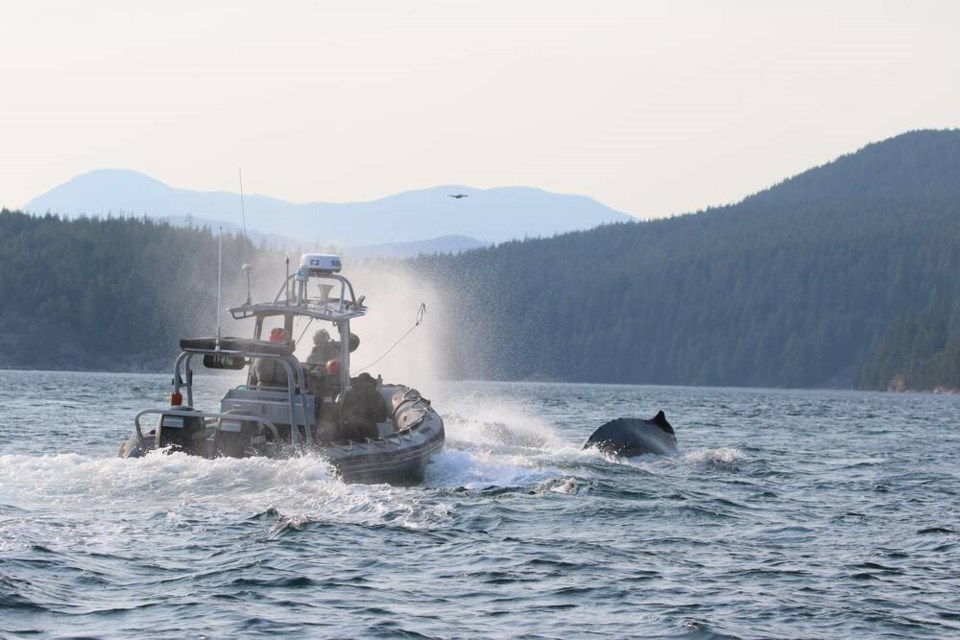A pair of humpback whales tied together with prawn fishing gear were disentangled during a five-hour rescue operation in the Discovery Islands near Campbell River.
Paul Cottrell, lead on Fisheries and Oceans Canada’s Marine Mammal Rescue Unit, said Monday it was a potentially dangerous situation for both whales and “extremely rare” that the pair would be tangled in the same lines.
“You have a situation where one of the whales could have drowned and brought the other one down, or they both drown,” Cottrell said in an interview.
Kayakers first reported the whales towing ropes and buoys on Thursday, and members of Straitwatch, a stewardship whale program, picked up their trail heading north.
Cottrell’s team spotted the pair travelling in unison the next morning.
The buoys were missing the next day, but both whales were still tangled in prawn lines — one with a rope through its mouth and the other with lines around its pectoral fin.
The humpbacks were identified by Straitwatch as Raza (BCX1852), known for the long propeller scar marks along its back, and Mogul (BCY1108). The Canadian Humpback Collaboration confirmed the identities.
Both were moving at a steady speed, but remained together without attempting to split off during the rescue, which Cottrell said was fortunate. The sea was relatively calm but a wind was blowing, he said.
After surveying the tangle with a camera drone, Cottrell threw a “working line” with grapple. That allowed Cottrell’s crew to place larger buoys on the whales’ lines and increase the drag.
At one point, the whales were pulling the rescue boat, but the drag eventually allowed them to slip free from the ropes.
About 300 feet of prawn lines were retrieved.
“In all the years I’ve been doing this, I’ve never seen two tangled together,” Cottrell said. “It was quite something and we were just euphoric when we got them free.”
He said neither of the whales appeared to be injured, though Mogul seemed to have scarring on its peduncle, the muscular area where the fluke connects to the body.
Raza is known to go to the breeding grounds of Mexico, according to the Marine Education and Research Society, and is well-known to the B.C. feeding grounds from Campbell River to Victoria.
In October 2018, Raza had open wounds from a boat propeller — injuries first documented by Ryan Stewart in the Discovery Islands area.
Raza is likely male, but researchers do not know for sure. The Marine Education and Research Society said the strongest clue to its sex is witnessing Raza’s interaction with two other whales that very much look like competitive group behaviour.
Both whales swam into Johnstone Strait after the rescue, and Raza was spotted Saturday in Alert Bay.
Details about Mogul were not immediately available. Mogul is a male who migrates to Hawaii and was first documented in 2018.
Marine researcher Jackie Hildering said the birth year and mothers are not known for either whale, and added the two whales are not known to associate with one another.
Cottrell said it’s been a “very busy” summer for reports of entangled humpbacks with about two calls a week since early July. Some have been located and untangled, but others have not been located since being reported.
A humpback whale without a tail has not been seen for more than month and likely did not survive, Cottrell said. The whale was seen last month off Vancouver Island’s coast and was last spotted moving south amid the U.S. San Juan Islands.
The injury appeared to be a fairly clean cut and was likely the result of either an entanglement or a strike by a vessel or propeller, Cottrell said.
The whale’s ability to dive, forage for food and migrate would have been significantly impeded by the loss of its fluke.
Cottrell said there have been no reports of any new sightings of Brave Little Hunter, the orphaned young orca that was trapped in a tidal lagoon after the death of its mother.
A lone young killer whale spotted July 5 surfacing at Friendly Cove off the west coast of Vancouver Island was widely believed to be the orphaned calf.
Cottrell said he believes the calf’s chances at survival were good and reports of the little orca may still emerge.
>>> To comment on this article, write a letter to the editor: [email protected]



